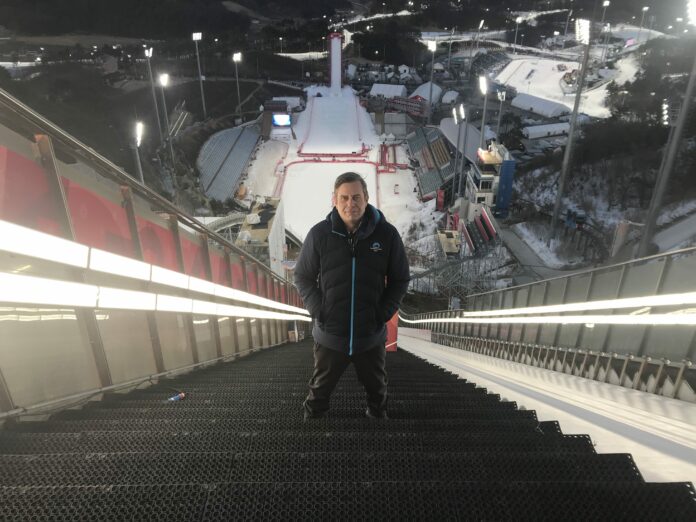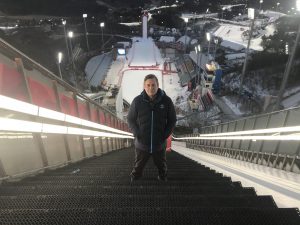
Snowboard Magazine’s Mark Sullivan and Hot Water Inn’s Mark Oliver start podcast
BY HAYDEN SEDER

Hot Water Inn founder Mark “Beav” Oliver and Snowboard Magazine founder and Olympic announcer Mark Sullivan recently launched a new, commercial-free podcast called The Snowboard Project. The show consists of long-format interviews and weekly news shows with episodes released on Mondays, Wednesdays and Fridays.
The Snowboard Project is available with the iTunes’ podcast app, Google podcast, Spotify and wherever podcasts are available to listen to.
For the hosts, snowboarding is more than a sport—it’s a way of life. This podcast is an effort to get back to those roots and tell the honest stories of the sport. The snowboard itself is a vehicle; one to get over snow but also to take you around the world, introduce you to new and fascinating people and test you in ways you’ve never experienced.
The podcast—the only one dedicated entirely to the sport of snowboarding—has already made great strides, reaching the number one spot in winter sports podcasts in North America in just two weeks of being on air. The 12 podcasts, with guests such as Olympic snowboard halfpipe coach Ricky Bower, and Mike Gagliardi, from Never Summer Industries, tackle a myriad of topics, including parenting, following your passion, and learning new tricks.
Both Sullivan and Oliver bring a lifetime of snowboarding experience to the podcast. Sullivan has been in the industry for over 30 years, from starting at the age of 14 to becoming a sponsored athlete for several years, to starting Snowboard Magazine in his Hailey basement in 2004. Sullivan now works for NBC Sports as their snowboarding expert and had the opportunity to interview freeskiers and snowboarders during the last Olympics.
Oliver grew up in Sun Valley and started snowboarding at the age of 9 or 10, a time when snowboarding was still banned on certain runs on Bald Mountain and the sport had barely caught on.
“At the time, in Sun Valley, there were very few snowboarders,” Oliver said. “I remember being only one of about six snowboarders on the mountain. The ski program at Hemingway had one group of snowboarders that was just Wyatt Caldwell, Rudi Broschofsky, and me.”
Oliver and Sullivan met over a decade ago when Oliver went with Sullivan to Alaska to film some pro snowboarders. Sullivan subsequently started the annual event Tailgate Alaska and asked Oliver to do media for the event. The two have also announced at amateur events in the Valley where they developed the rapport that they now use in their shows.
“Beav is a local and he really is a snowboarder’s snowboarder,” Sullivan said. “He’s dedicated to it and understands from a personal perspective the sport and the goings on and has an opinion on it.”
Oliver is equally inspired by his partner’s energy.
“Mark is an interesting guy because he’s really driven,” Oliver said. “He gets up in the morning and all he can think about is this one thing [snowboarding]. When we started brainstorming about the podcast, we were thinking about what the industry needs and has been lacking. It seemed like the heritage of snowboarding has kind of been lost. Our podcast is about truth and discovering the wonderment we had in snowboarding when we first started as kids.”
One thing that separates The Snowboard Project from other podcasts is their advertising-free model, creating a platform where sponsors don’t have a say. While there are so many positive aspects of snowboarding—the amateurs who rise to fame, winning medals, meeting new people—there is a dark side as well, which Sullivan and Oliver don’t shy away from.
“The interviews are about the realities of snowboarding,” Oliver said. “In snowboarding, there’s the glory of winning and the agony of defeat, but also the agony of the athlete who gets addicted to drugs and loses it all or the athlete that didn’t plan for his future and got dropped by sponsors. These are universal stories; they happen in a lot of different sports. I think it’s something that needs to be talked about—what happens when the party ends.”
Using his contacts developed over his years in the industry, Sullivan has already banked about 60 interviews with various members of the snowboard community. With Sullivan interviewing and Oliver producing and editing the audio, the duo is currently putting out three podcasts a week, with the goal of upping that number to five.
Without money from advertisers, The Snowboard Project has come to rely on its listeners to financially support what it takes to produce such a prolific podcast. Using a platform called Patreon, listeners can donate as little as $1 to the podcast. The podcast already has a supportive audience—and a growing one, at that.
“No other podcast that covers skiing or snowboarding ranks with ours after two weeks,” Sullivan said. “That’s pretty rewarding—to know we’re putting a different foot of snowboarding forward. Hopefully, our podcast will promote snowboarding to a wider audience.”
For more information, visit patreon.com/thesnowboardproject.
